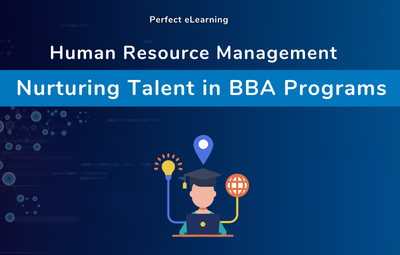

Human Resource Management encompasses the practices and processes involved in managing an organization's workforce. In the context of BBA programs, HRM focuses on developing students' understanding of people management, leadership, and organizational behavior. Nurturing talent in BBA programs is crucial because it equips students with the necessary skills to become effective managers and leaders in their respective fields.
1. Role of HRM in BBA Programs
To nurture talent effectively, HRM should be integrated into the curriculum of BBA programs. By incorporating HRM courses, students gain a comprehensive understanding of human resource practices, policies, and strategies. This integration ensures that graduates possess the essential knowledge and skills needed to manage and lead people in diverse organizational settings.
2. Recruitment and Selection
An important aspect of talent nurturing is attracting and selecting individuals with the potential to succeed in managerial roles. BBA programs should emphasize effective recruitment and selection processes to identify talented individuals. This involves developing strategies to attract top talent, utilizing assessment tools, and conducting interviews that assess not only technical skills but also critical thinking, problem-solving, and interpersonal abilities.
3. Training and Development
Once talented individuals are identified, BBA programs should provide them with training and development opportunities to enhance their skills and knowledge. Training programs can focus on areas such as communication, teamwork, negotiation, and conflict resolution. Additionally, students should be encouraged to engage in continuous learning through workshops, seminars, and industry-specific certifications.
4. Performance Management
In order to nurture talent effectively, BBA programs should incorporate performance management practices. This involves setting clear expectations and goals for students, providing regular feedback on their performance, and offering coaching and support to help them improve. By instilling a performance-oriented culture, BBA programs can prepare students for the competitive nature of the business world.
5. Employee Engagement and Motivation
Creating a positive work environment is essential for talent nurturing. BBA programs should focus on fostering employee engagement and motivation among students. This can be achieved through various means, such as encouraging collaboration, recognizing and rewarding achievements, and promoting a healthy work-life balance. By cultivating a supportive and engaging atmosphere, BBA programs can inspire students to perform at their best.
6. Succession Planning
Succession planning is a critical aspect of talent nurturing in BBA programs. Identifying students with leadership potential and providing them with opportunities for growth and development is essential. By nurturing future leaders, BBA programs contribute to the long-term success of organizations and industries. Succession planning involves creating a talent pipeline to ensure a smooth transition of leadership roles.
7. Diversity and Inclusion
Diversity and inclusion are vital in talent nurturing within BBA programs. Embracing individuals from diverse backgrounds and perspectives fosters creativity, innovation, and a broader understanding of global business issues. BBA programs should promote an inclusive culture that values and respects differences, creating an environment where all students can thrive and contribute effectively.
8. Future Trends in HRM
The field of HRM is continually evolving, and BBA programs need to adapt to future trends. Remote work and virtual collaboration have become increasingly prevalent, and BBA programs should equip students with the skills to thrive in these environments. Additionally, emotional intelligence, which involves understanding and managing emotions effectively, is gaining prominence in HRM. BBA programs should emphasize the development of emotional intelligence skills to prepare students for successful leadership.
Conclusion
Nurturing talent in BBA programs is crucial for preparing future managers and leaders. By integrating HRM into the curriculum, focusing on recruitment and selection, providing training and development opportunities, and implementing performance management practices, BBA programs can equip students with the necessary skills and competencies. Additionally, promoting employee engagement, diversity and inclusion, and leveraging technology contribute to the overall success of talent nurturing efforts. As the business landscape continues to evolve, BBA programs must adapt to future trends in HRM and equip students with the skills to excel in a dynamic environment.
FAQs
Q. How does HRM contribute to talent nurturing in BBA programs?
A. HRM plays a crucial role in talent nurturing by integrating relevant courses into the curriculum, focusing on recruitment and selection, providing training and development opportunities, implementing performance management practices, and fostering employee engagement and motivation.
Q. Why is diversity and inclusion important in BBA programs?
A. Diversity and inclusion promote creativity, innovation, and a broader understanding of global business issues. Creating an inclusive culture ensures that all students have an equal opportunity to succeed and contribute effectively.
Q. How can technology enhance talent nurturing in BBA programs?
A. Technology can enhance talent nurturing by facilitating recruitment processes, providing online training modules, and using data analytics for performance management. It improves efficiency, effectiveness, and the overall learning experience for students.
Q. What are the challenges in talent nurturing within BBA programs?
A. Challenges in talent nurturing include retaining top talent due to the competitive job market, addressing skill gaps, and adapting to changing career aspirations. Building strong relationships with students, providing mentorship programs, and incorporating industry-relevant courses can help overcome these challenges.


